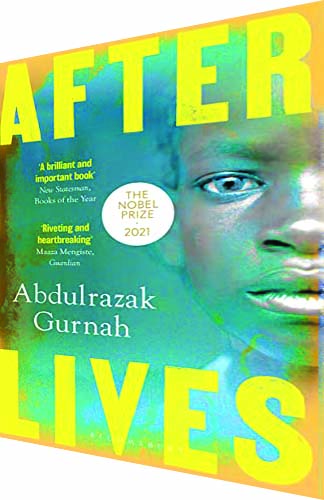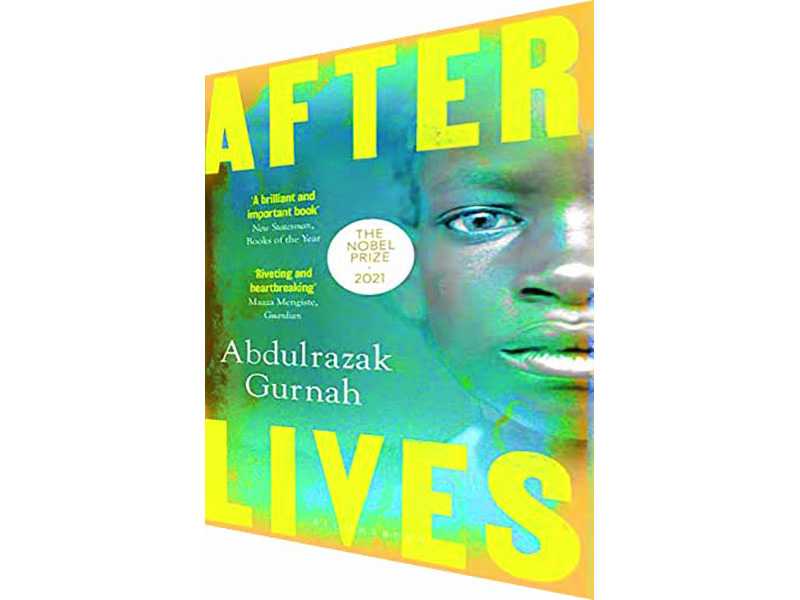
Afterlives
Abdulrazak Gurnah
bloomsbury publishing
Rs.499
Pages 273
-Sharmila Narayana
Afterlives is the latest book from Abdulrazak Gurnah, the Nobel laureate for literature, 2021. His novels predominantly focus on the themes of displacement, colonisation, migration, identity and slavery. In an essay published in 2004, Gurnah explains that his own hardships, anxiety, state terror and humiliation, as he migrated from Zanzibar to the UK, became prominent themes in his works.
The background of this novel is the German occupation of East Africa, the Maji Maji Uprising against the Germans and the First World War. It explores the impact of European colonialism, and violence and racism of Germans in Africa, hitherto a well-kept secret.
The book is divided into four sections. The first takes the reader to the heart of a bleeding East Africa suffering German colonisation and the Maji Maji uprising. The Germans, apart from using military force, starve the people into submission. Through his slow and detailed narration, Gurnah recreates the trauma and horrors of colonisation. Lives are torn asunder, shattered and bruised.
Ilyas runs away from home, only to be captured by German troops. His sister, Afiya, is given away to another family by her father after her mother’s death. Gurnah graphically details Afiya’s miserable life with her foster parents and the abuse and violence to which she is regularly subjected. Ilyas escapes and returns to his hardly recognisable ancestral village in search of his sister.
The protagonist, Hamza, is introduced in the second section which pivots around his harrowing experiences in the German army fighting World War I, including sexual abuse by an officer. The horrors of war come alive in this section. Severely wounded, Hamza is nursed back to life by a kind pastor and his family. However, like Ilyas, when he returns to his birthplace on the coast after seven years, he finds it unrecognisable, with no trace of family and friends. Neighbourhoods had just vanished. “When he fled it had seemed like an undoing of a life but for now it has ended with the futility of him returning to where he had been before, older, half-broken, empty-handed,” writes Gurnah.
In section three, Hamza, overwhelmed by the cruelties he has experienced, makes a determined effort to rebuild his life. He finds work at Nassor Biashara’s warehouse and gets modest accommodation in Khalifa’s house, where he falls in love with Afiya. Hamza and Afiya marry and settle down, promising to comfort each other.
The last section dwells on Afiya and Hamza’s son, Ilyas, named in remembrance of Afiya’s brother, who never returned from the war. The trauma of war continues to haunt Hamza as he has nightmares. He wonders whether it is his own trauma or Afiya’s memories of her lost brother that are haunting him. As the novel ends, Ilyas is 38 years old employed as a broadcaster in the Federal Republic of Germany. There he discovers that uncle Ilyas was sent to the Sachsenhausen Concentration camp for breaking Nazi race laws, and was eventually shot, trying to escape.
In a Dickensian manner, Gurnah takes the reader through vivid descriptions of characters and events. The reader literally travels to every nook and corner of the village/town, feels Hamza’s pain and sees fear and terror in the eyes of the subjugated. The lowest ebb is the natives’ fall from innocence, as some of them are carried away by coloniser propaganda. On multiple occasions, in the first section of the novel, llyas is seen supporting the Germans, stating that they are gifted and clever people who have done good for the natives. This fascination for Germans is what pushes him to volunteer for their army.
As the title suggests Afterlives examines the story of ordinary people, torn apart in the aftermath of colonisation. Unlike the loud and powerful tone of Nigerian novelist Chinua Achebe, Gurnah’s narration is gentle, calm and mellow, but deeply disturbing, as it tells of Africa ravaged by colonisers and demoralised by racism. As one of Ilyas’ friends says, “…the Germans have killed so many people that the country is littered with skulls and bones and the earth is soggy with blood”. The novel chronicles the struggles of Africans over a time period of more than fifty years during which natives are press ganged to fight for their tormentors.
However, things don’t completely fall apart in Afterlives. Hamza returns to his war-ravaged hometown to piece together the broken fragments of his life. He realises that there is no greater shame than one’s body and spirit being owned by another human being. Gurnah unfolds the romance between Hamza and Afiya as tenderly as a lyrical poem. Desolation and emptiness give way to dreams of a meaningful life together. However tumultuous the passage might have been for its characters, the book is a beacon of hope for readers.
Also Read:How China played America: A new cold war
